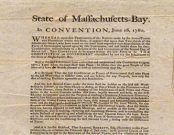The Administrative State and Its Law
This past weekend (October 23-24), George Mason Law School’s Law and Economics Center, in cooperation with the Council on Public Policy (a German think tank) and the Federalist Society, concucted a Transatlantic Law Forum on “The Administrative State and its Law.” Excerpts:
Scholars, pundits, politicians, and even Supreme Court Justices have come to lament that the administrative state—ill suited to the country’s constitutional culture in any event—appears increasingly beyond effective political and judicial control. Among the proposed remedies, perplexingly, is a quintessentially “European” product: bureaucratic legalism, either through more specific legislation or more aggressive judicial controls (or both). All the while, prominent scholars argue from diametrically opposed vantages that all administrative law is a charade—an unlawful departure from constitutional norms, or a thin veneer for an essentially “Schmittian” state above and beyond effective legal control.
If that raging debate seems confusing and perhaps bizarre to Europeans scholars, American scholars are bound to be equally perplexed at the absence of any comparably fundamental (and polemical) debate on the European Continent. Perhaps, [national] administrative law traditions are too entrenched to yield readily to ideological demands or perceived social imperatives. Oddly, though, they have posed no obstacle to the emergence of a highly improvisational, “networked” European administrative law without a state, a superintending legislature, reliable hierarchical controls, or systematic judicial controls.
The basic idea here is to expand the administrative law debate across countries and across disciplines, from financial regulation to energy to monetary policy to tax. It’s not just that you learn more stuff that way; it’s that you learn stuff that makes you think. You’ll learn, for example, that in Germany—the country that supposedly inflicted sinful administrative law notions on this virgin continent—you get an independent court that can, and routinely does, impose preliminary injunctions against the collection of a tax. The money is yours until the government proves otherwise (same with land, BTW). Stateside, it’s the other way around. What gives?
Too much to sort out in a mere two days, even for the all-star cast of this conference. But it’s a great start to a much-needed debate; and I’m pleased to report that GMU Law, through a new Center for the Study of the Administrative State, is in this for the long haul.
The conference proceedings will be webcast, and worth watching; I’ll have links and comments.

